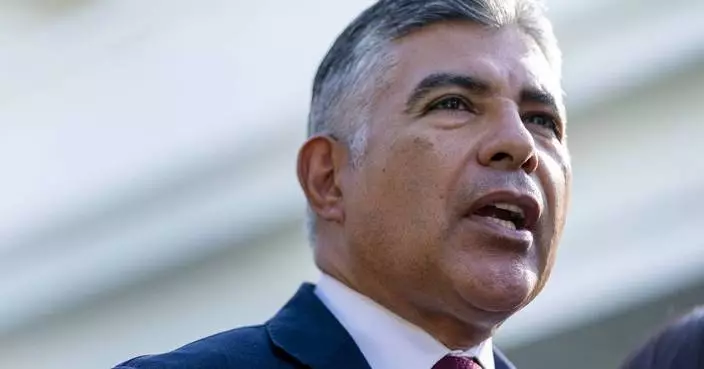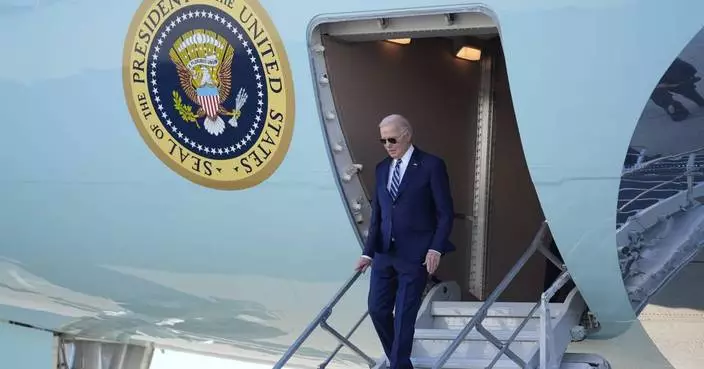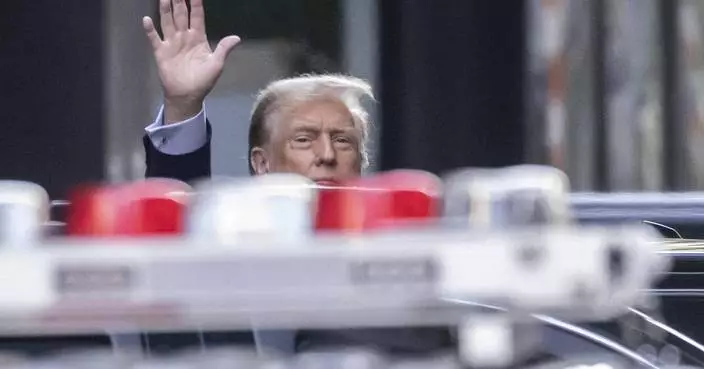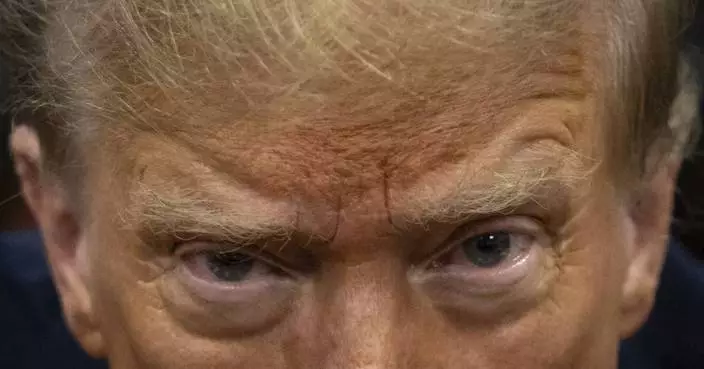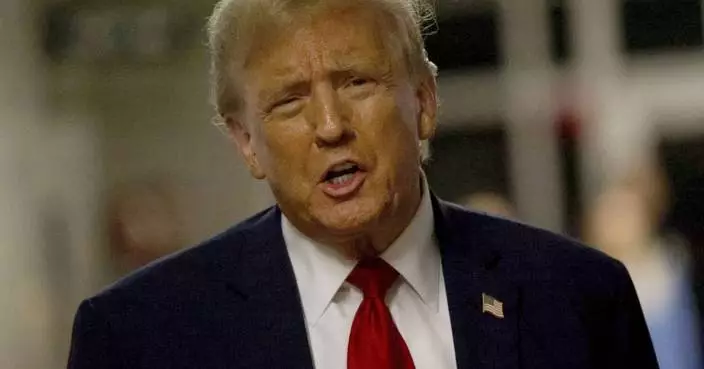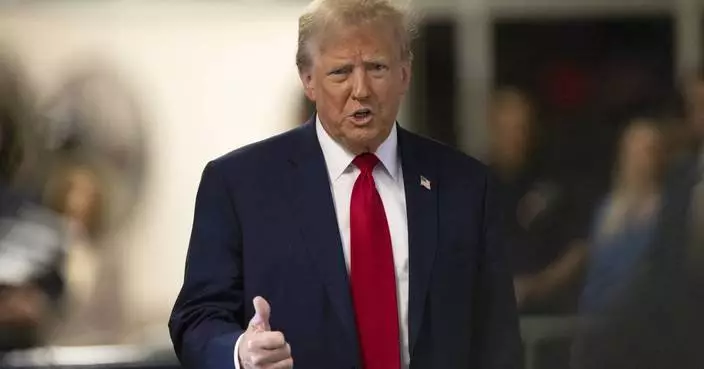Cincinnati resident Andrew Pappas supported President Trump's decision to separate children from parents who crossed the border illegally because, he said, it got Congress talking about immigration reform.

President Donald Trump speaks during a roundtable discussion on protecting American workers in Duluth, Minn., Wednesday, June 20, 2018. (AP Photo/Susan Walsh)
Niurka Lopez of Michigan said Trump's "zero-tolerance" policy made sense because her family came to the U.S. legally from Cuba and everyone else should, too.
Die-hard Trump supporters remained steadfast even as heart-rending photos of children held in cages and audio of terrified children crying out for their parents stoked outrage among Democrats and Republicans alike. They said they believed Trump and Homeland Security Secretary Kirstjen Nielsen when they falsely claimed that they had no choice but to enforce an existing law.
When Trump signed an executive order on Wednesday to end forced separations on his own, they shrugged. The end, they suggested, justified the means. And it was the fault of Congress rather than Trump.
"The optics of what's happening here directly at the border isn't something that he wants to have on his watch, but at the end of the day, he still wants to focus the attention of Congress on the fundamental need for immigration reform in the United States and I think he's gonna hold firm on that," said Pappas, 53.
"His goal was not to rip families apart, I think his goal was to make Congress act on immigration reform," Pappas added. "And now ...everyone's talking about immigration reform and I think President Trump is getting exactly what he wants."
Sixty-five-year-old Richard Klabechek of Oak Grove, Minnesota, who attended the president's rally Wednesday evening in Duluth, Minnesota, said he was unmoved by the audio of crying children, saying it was "the media playing the heartstrings of the public." And he said Trump was simply being Trump.
"I think Trump takes issues on in his own direct way, but it doesn't fit the politically correct narrative of the media or the Democrats," said Klabecheck, who is retired.
Lopez, 54, said Trump "really cares for the United States of America and the people of the United States of America and to protect us from people that want to hurt us."
Others shared her assessment.
John Trandem, 42, who owns an automotive services company near Fargo, North Dakota, said he has supported all of Trump's decisions during the border controversy.
"He's certainly not a man without compassion. He's not a monster as he's being framed by the media and by the left," said Trandem, who was a delegate at the 2016 Republican convention where Trump clinched the nomination for president.
"He recognizes that it's a very challenging issue. ... Nobody wants to see parents and children separated, but ... the blame should be put squarely back on the shoulders of the people who broke the law in the first place."
Trump voter Terry Welch of Broken Arrow, Oklahoma, said he blames Congress and its GOP leadership for not reforming immigration laws, though he admits he doesn't like Trump as a person.
"It's a terrible situation," Welch, 43, said of the distraught children. "I think everybody believes that."
Still, he said the president's dramatic reversal on separating children won't solve anything: "I see that as placating people."
NEW YORK (AP) — Donald Trump says he wants to hold a major campaign event at New York's Madison Square Garden featuring Black hip-hop artists and athletes. His aides speak of making appearances in Chicago, Detroit and Atlanta with leaders of color and realigning American politics by flipping Democratic constituencies.
But five months before the first general election votes are cast, the former president's campaign has little apparent organization to show for its ambitious plans.
The Trump campaign removed its point person for coalitions and hasn't announced a replacement. The Republican Party's minority outreach offices across the country have been shuttered and replaced by businesses that include a check-cashing store, an ice cream shop and a sex-toy store. And campaign officials concede they are weeks away from rolling out any targeted programs.
The presumptive Republican presidential nominee has struggled to navigate a messy transition into the general election plagued by staffing issues, his personal legal troubles and the “Make America Great Again” movement's disdain for so-called “ identity politics.” There are signs of frustration on the ground, where Republicans believe Trump has a real opportunity to shift the election by cutting into President Joe Biden’s advantages with voters of color.
“To be quite honest, the Republican Party does not have a cohesive engagement plan for Black communities,” said Darrell Scott, a Black pastor and longtime Trump ally who co-founded the National Diversity Coalition for Trump in 2016. “What it has are conservatives in communities of color who have taken it upon themselves to head our own initiatives.”
On-the-ground political organizing has long been a hallmark of successful presidential campaigns, which typically invest tremendous resources into identifying would-be supporters and ensuring they vote. The task may be even more critical this fall given how few voters are excited about the Biden-Trump rematch.
But in Michigan, a critical battleground that flipped from Trump to Biden four years ago, several party officials confirmed that the Republican National Committee, overhauled by Trump allies after he clinched the nomination in March, has yet to set up any community centers for minority outreach. Office spaces to house the centers have been offered up by community members, but staffing has been an issue, said Oakland County GOP Chair Vance Patrick.
“We’ve got all these carts but we have no horses yet,” said Patrick. “So, it’s all about making sure we have staffing when we open up these offices.”
In Wayne County, home to Detroit, local Republican officials say they are currently trying to figure it out on their own.
“It’s me setting up events, or people just reaching out to me,” said Rola Makki, the outreach vice chair for the Michigan GOP, noting that she hasn’t seen any minority outreach centers open in spite of claims to the contrary by Trump’s national campaign team.
In recent years, the Republican National Committee invested big in community centers and minority outreach based on the belief that real relationships with voters, even those who typically don't support Republicans, would make a difference on Election Day. Since taking over the RNC earlier in the spring, however, Trump's team has dramatically scaled back such efforts.
“Traditionally, Republicans have not been effective in their efforts to persuade Black and Hispanic voters to vote for our party,” said Lynne Patton, a senior adviser on the campaign overseeing coalitions work who has worked closely with the Trump family for decades. "But this is yet another reason why President Trump was adamant that his hand-picked leadership team assume control at the RNC and spearhead a unified effort to embrace the historic defection being witnessed within Black & Hispanic communities from the Democrat party and ensure it's permanent.”
The Trump campaign hired a national coalitions director in October 2023, almost a year after he launched his campaign. But the staffer, Derek Silver, departed in March without explanation, according to two people familiar with the matter who spoke on the condition of anonymity to share internal discussions. Silver did not return multiple requests for comment and no replacement has been announced.
Trump's advisers reject criticism that they're not doing enough organizing or spending to reach minorities. James Blair, the campaign's political director, said the campaign would not “broadcast” its spending or staffing levels, “but I assure you, it's enough to ensure President Trump’s historic surge in support amongst Black and Hispanic voters sticks in November and beyond.”
Patton said Trump’s political team is laying the groundwork for a robust minority outreach program, although largely in private.
“We are speaking with Black leaders, we are speaking with small business owners, we’re speaking with famous athletes, hip-hop artists, some of whom I think you’d be surprised if you knew who was talking with us right now,” Patton said in an interview. “These are people who are expressing openness to supporting President Trump both publicly and privately.”
She conceded that the campaign is still weeks away from rolling out any specific minority outreach programs. The delayed timeline stands in stark contrast to the early outreach during Trump’s 2020 reelection bid. Then, he launched his coalition efforts, including “Latinos for Trump” and “Black Voices for Trump” programs, in the summer and fall of 2019, respectively.
Trump's team insists the former president will improve his standing with voters of color, perhaps the most steadfast segment of the Democratic base, regardless of their strategy. They believe the campaign has momentum with both African Americans and Hispanics, especially younger men. And they note that Trump has proven he can win in his own way, disregarding traditional rules of politics.
Polls show that many Black and Hispanic adults are dissatisfied with Biden. According to AP-NORC polls, Biden's approval among Black adults has dropped from 94% when he started his term to just 55% in March. Among Hispanic adults, it dropped from 70% to 32% in the same period.
And an April poll by the Pew Research Center confirms the problem is especially acute among younger adults: Just 43% of Black adults under 50 said they approve of Biden in that poll, compared with 70% of those age 50 and older. Among Hispanics, 29% of younger adults said they approve, slightly less than the 42% who said that among those 50 and older.
The Trump campaign’s developing outreach strategy relies on using his celebrity and bombastic personality to create viral moments in communities of color that his advisers believe will have more impact than grassroots organizing or paid advertising alone. Advisers point to Trump's appearances at an Atlanta Chick-fil-A, a New York bodega and a New York City police officer's wake as examples of the strategy.
His allies argue that increased frustration about crime, inflation and immigration may win over some voters of color who have previously been less receptive to Trump’s record and divisive rhetoric.
“Communities of color aren’t leaning towards the right, they’re leaning towards Trump,” said Scott, the pastor and close Trump ally who is calling on the RNC to ramp up and reform its efforts. Scott said Black voters support Democrats because of the party's longtime outreach to the community, which the GOP has not matched, and said the present campaign presents an opportunity that the party shouldn't waste. “Trump is the draw; Trump is the magnet.”
Biden has been spending millions of dollars on ads targeting Black and Latino voters in presidential battleground states. That's in addition to dozens of new office openings in minority neighborhoods. All the while, Biden's team has frequently dispatched Vice President Kamala Harris, the nation's first Black female vice president, and other prominent leaders of color to key states.
The Democratic president's campaign points to record-low minority unemployment rates and education policies like funding for historically Black colleges and universities and student loan forgiveness, as well as Biden's stance on civil rights policy.
“Donald Trump and MAGA Republicans proudly admitting that they have no real strategy to reach Black voters because they believe all they need is rap concerts and free chicken is only surprising if you haven’t paid attention to Trump’s fraudulent relationship to Black America for years,” said Jasmine Harris, the Biden campaign's Black media director, who described Trump as “a fraud” who "takes every opportunity available to him to demean our community.”
Trump's personal legal troubles may also be complicating his plans.
Campaign officials believe they should wait to unveil new initiatives until the conclusion of Trump’s New York criminal hush money trial, which is expected to extend deep into May, if not longer.
In the meantime, there are visible signs of a lack of investment in swing states. Associated Press reporters visited the sites of several former community outreach centers that have now been shuttered.
In Allentown, Pennsylvania, the GOP vacated its Hispanic outreach office in January 2023, a few months after the midterm election, according to the landlord, Hem Vaidya. He said the office, which he recalled as a busy place, was staffed by Hispanic workers.
Republican officials recently approached him about renting the same space again, but he declined because they only wanted it for eight months. The storefront is now occupied by his own check-cashing business.
In Wisconsin, the Republican National Committee closed a Hispanic outreach center in Milwaukee after the 2022 midterms and it will soon be home to an ice cream shop, according to Daniel Walsh, leasing agent for the property.
Matt Fisher, a spokesman for the Wisconsin Republican Party, said the state GOP continues to operate a Black outreach center in Milwaukee. As for targeting Hispanic voters, the state party and RNC are still weighing how to approach that task.
In suburban Atlanta, one RNC community outreach center focused on outreach to Asian American voters was shuttered and later was reopened as a sex shop. AP reporters confirmed the venue's change in ownership, which was originally reported by the Atlanta Journal-Constitution.
Republican strategist Alice Stewart, a veteran of several GOP campaigns, said she's confident that the Trump campaign will ultimately do what's necessary.
“But the key is they can’t just talk about minority outreach,” she said. “They have to do it.”
Brown reported from Washington. AP Director of Public Opinion Research Emily Swanson in Washington and Associated Press writers Joey Cappelletti in Lansing, Michigan; Michael Rubinkam in Allentown, Pennsylvania; Todd Richmond in Madison, Wisconsin; Julie Carr Smyth in Columbus, Ohio; and Sean Murphy in Oklahoma City, Oklahoma, contributed.
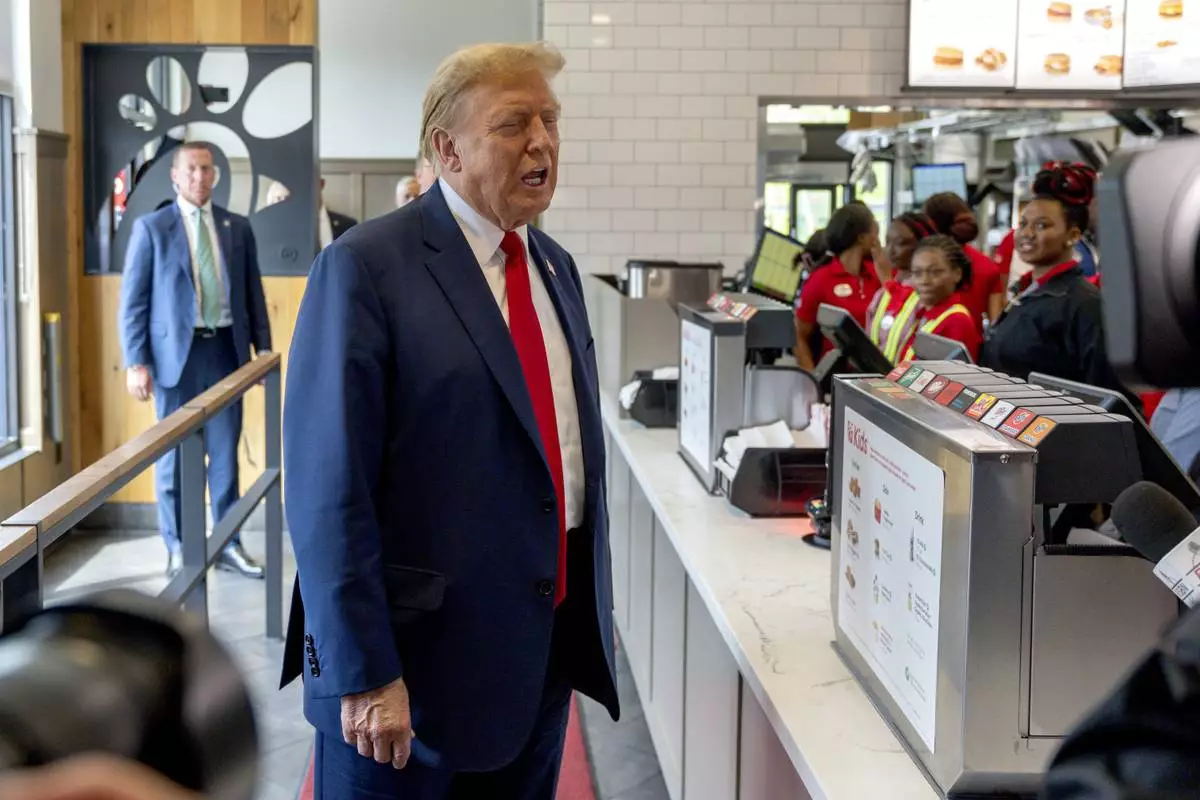
FILE - Republican presidential candidate former President Donald Trump visits a Chick-fil-A eatery, April 10, 2024, in Atlanta. Five months before the first general election votes are cast, Trump's campaign has little to show for its ambitious minority outreach plan. Trump advisers point to Trump's appearances at the eatery, as well as a New York bodega and a New York City police officer's wake as examples of the campaign's developing outreach strategy that hinges on using Trump's celebrity and bombastic personality to create viral moments in communities of color. (AP Photo/Jason Allen, File)
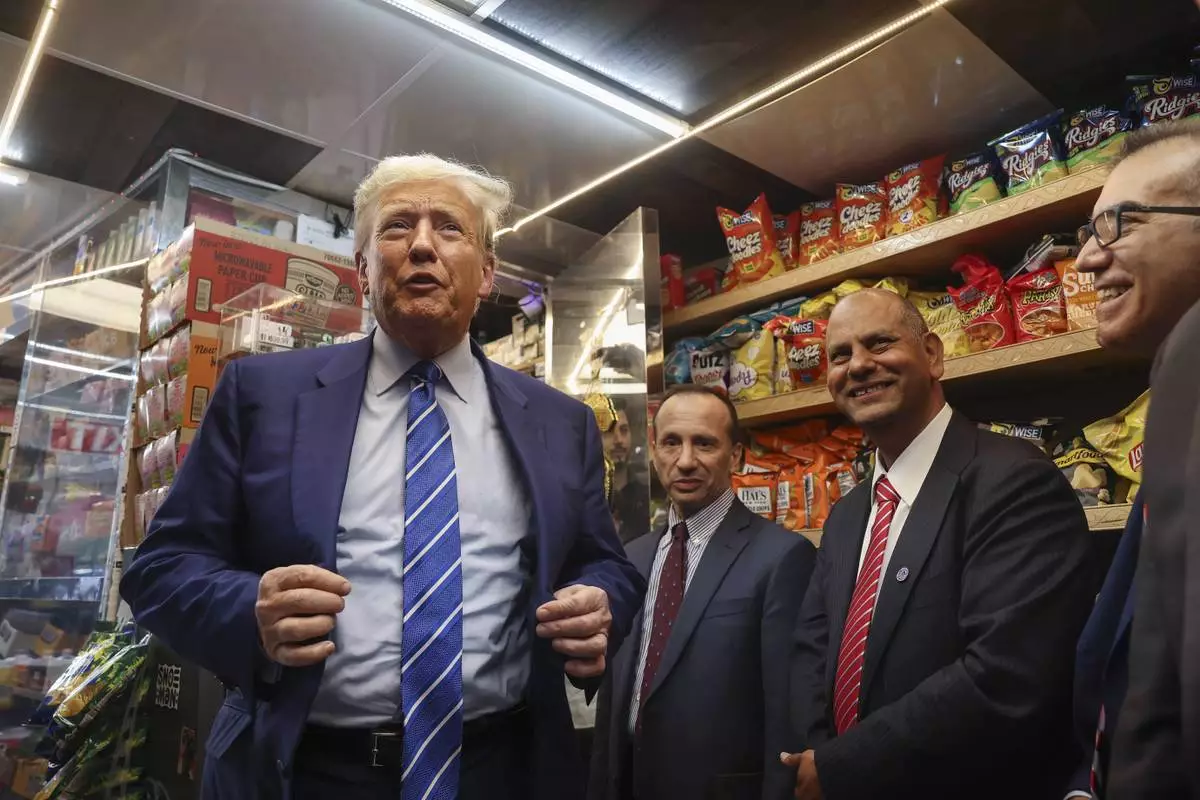
FILE - Republican presidential candidate former President Donald Trump, left, visits a bodega, April 16, 2024, in New York. Five months before the first general election votes are cast, Trump's campaign has little to show for its ambitious minority outreach plan. Trump advisers point to Trump's appearances at the bodega, an Atlanta Chick-fil-A, and a New York City police officer's wake, as examples of the campaign's developing outreach strategy that hinges on using Trump's celebrity and bombastic personality to create viral moments in communities of color. (AP Photo/Yuki Iwamura, File)






